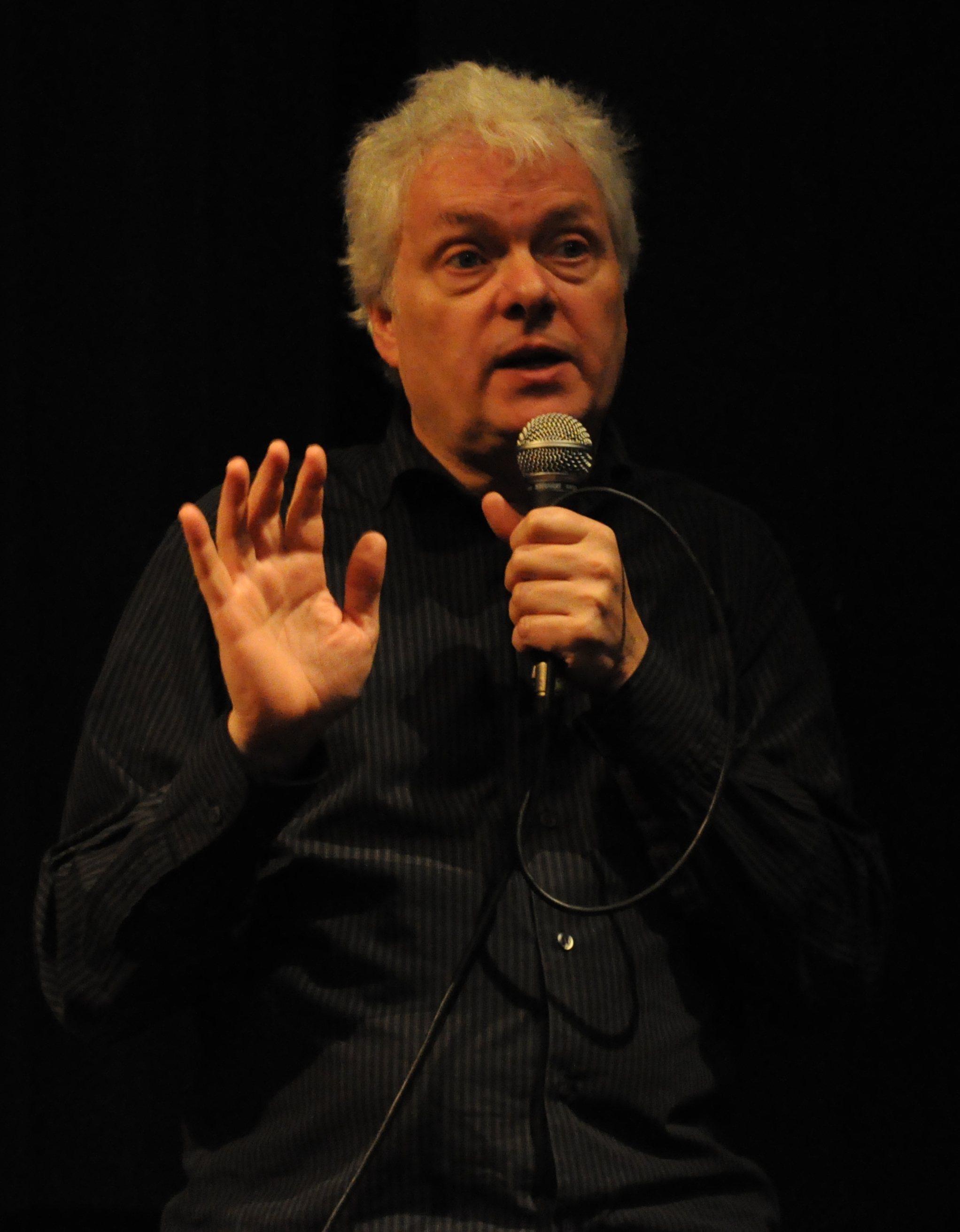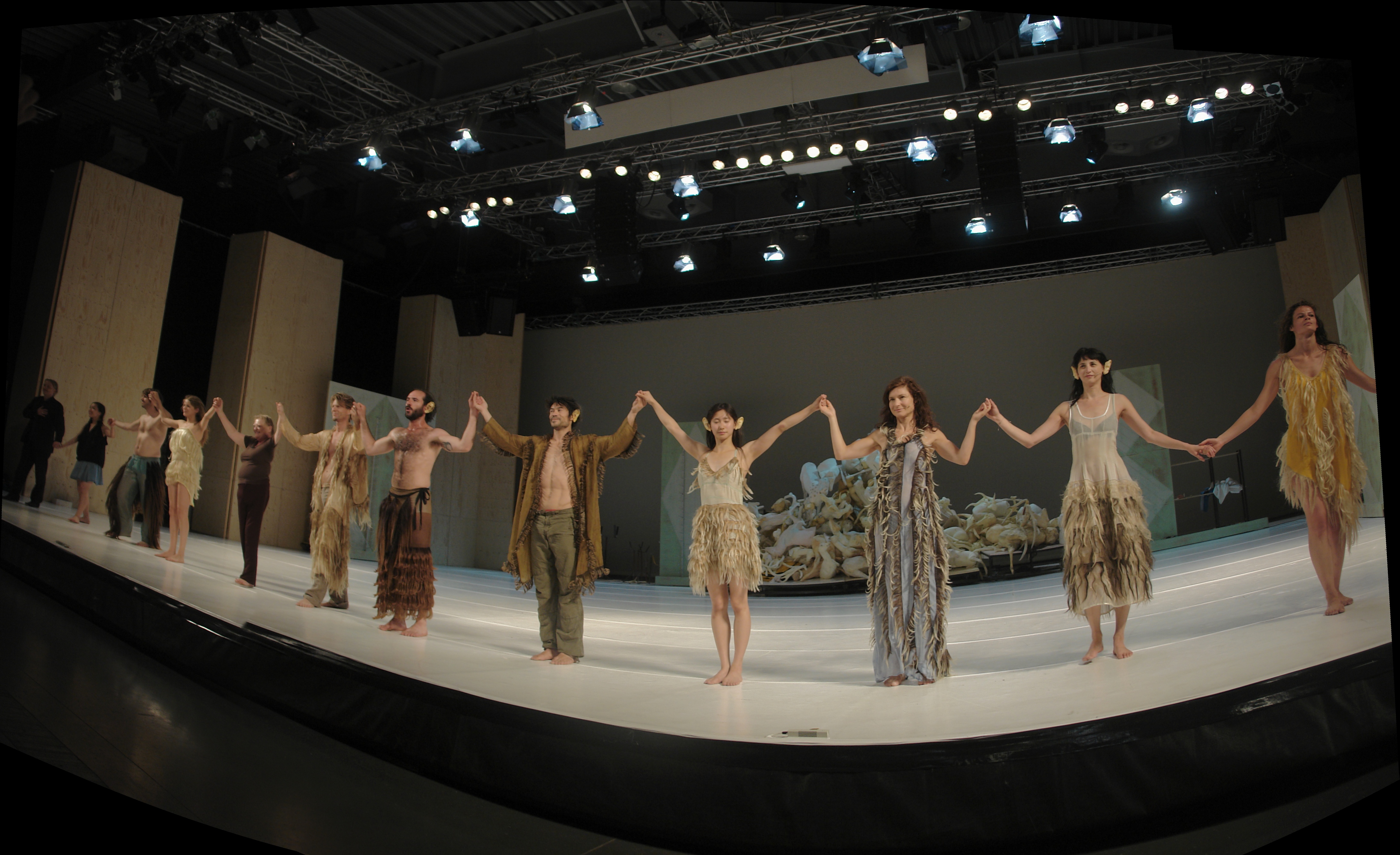|
Postdramatic Theatre
The notion of postdramatic theatre was established by German theatre researcher Hans-Thies Lehmann in his book ''Postdramatic Theatre'', summarising a number of tendencies and stylistic traits occurring in avant-garde theatre since the end of the 1960s. The theatre which Lehmann calls postdramatic is not primarily focused on the drama in itself, but evolves a performative aesthetic in which the text of the performance is put in a special relation to the material situation of the performance and the stage. The postdramatic theatre attempts to mimic the unassembled and unorganized literature that a playwright sketches in the novel. Postdramatic theatre, thus, strives to produce an effect amongst the spectators rather than to remain true to the text. Lehmann locates what he calls 'the new theatre' as part of 'a simultaneous and multi-perspectival form of perceiving'; this, he argues is brought about, in large part, by a reaction to the dominance of the written text. The new theatre, ... [...More Info...] [...Related Items...] OR: [Wikipedia] [Google] [Baidu] |
Richard Foreman
Richard Foreman (born Edward L. Friedman; June 10, 1937 – January 4, 2025) was an American avant-garde experimental playwright and the founder of the Ontological-Hysteric Theater. Though highly original and singular, his work was influenced by Bertolt Brecht, Gertrude Stein, The Living Theatre, Surrealism and Dada. In the writing of his scripts the Dada cut-up technique was used. Foreman often played the central godhead puppet master during his plays as he sat in the center of the audience in the director/engineer’s seat from which he controlled the sound effects and other stage craft. He often spoke parts of the script in an omniscient voice through pre-recordings. In May of 2025, The Brooklyn Rail published a Tribute to Richard Foreman with contributions from poet Charles Bernstein, musician John Zorn, Richard Schechner, Kate Valk, Bonnie Marranca, P. Adams Sitney, Shauna Kelly, painter Susan Bee, Tony Torn, Jay Sanders, executive director and chief curator of ... [...More Info...] [...Related Items...] OR: [Wikipedia] [Google] [Baidu] |
Heiner Goebbels
Heiner Goebbels (born 17 August 1952) is a German composer, Conductor (music), conductor and professor at University of Giessen, Justus-Liebig-University in Gießen and artistic director of the International Festival of the Arts Ruhrtriennale 2012–14. His composition ''Stifters Dinge'' (2007) received five votes in a 2017 ''Classic Voice'' poll of the greatest works of art music since 2000, and writers for ''The Guardian'' ranked his composition ''Hashirigaki'' (2000) the ninth greatest classical composition of the same period. Biography Goebbels was born in Neustadt an der Weinstraße. He studied sociology and music in Frankfurt, Frankfurt am Main,Program for Pacific Musicworks / Seattle Chamber Players performance of Heiner Goebbels ''Songs of Wars I Have Seen'', On the Boards, Seattle, 4–6 March 2010. and has composed for ensemble and for large orchestra. He has created several prize-winning radio plays, staged concerts, and, since the early 1990s, music theatre works, wh ... [...More Info...] [...Related Items...] OR: [Wikipedia] [Google] [Baidu] |
Elfriede Jelinek
Elfriede Jelinek (; born 20 October 1946) is an Austrian playwright and novelist. She is one of the most decorated authors to write in German and was awarded the 2004 Nobel Prize in Literature for her "musical flow of voices and counter-voices in novels and plays that, with extraordinary linguistic zeal, reveal the absurdity of society's clichés and their subjugating power". She is considered to be among the most important living playwrights of the German language. Biography Elfriede Jelinek was born on 20 October 1946 in Mürzzuschlag, Styria, Austria, the daughter of Olga Ilona (''née'' Buchner), a personnel director, and Friedrich Jelinek. She was raised in Vienna by her Romanian-German Catholic mother and a non-observant Czech Jewish father (whose surname ''Jelínek'' means "little deer" in Czech). Her mother's family came from Stájerlakanina, Krassó-Szörény County, Banat, Kingdom of Hungary (now Anina, Romania), and was of a bourgeois background, while her father ... [...More Info...] [...Related Items...] OR: [Wikipedia] [Google] [Baidu] |
Josef Szeiler
Josef Szeiler (7 August 1948 in Sankt Michael im Burgenland) is an Austrian theatre director. As co-founder of the group Theater Angelus Novus he is first of all known for his experimental approach to texts by Heiner Müller, Bertolt Brecht, Homer and Greek dramas. Overview Josef Szeiler was born in Sankt Michael im Burgenland. At the end of the 1970s he worked as guest assistant for Benno Besson at the Volksbühne Berlin where he met the playwright Heiner Müller, who became a lifelong friend. Josef Szeiler's first theatre project in Vienna was Die Schlacht by Heiner Müller. Out of this project arose the group TheaterAngelusNovus which focused on a continuous reflection of theatrical aspects (“Selbstverständigung”) rather than producing small packages of ready made performances that could be consumed in a traditional setting. Still there were regular projects that were also publicly accessible, like the reading of the Iliad in its entire length which was held 1986 at t ... [...More Info...] [...Related Items...] OR: [Wikipedia] [Google] [Baidu] |
Frank Castorf
Frank Castorf (born 17 July 1951 in East Berlin) is a German theater director and was the artistic director of the ''Volksbühne am Rosa-Luxemburg-Platz'' from 1992 to 2015. His work is often associated with postdramatic theatre. Biography Early years Castorf's father was an ironmonger. Frank Castorf successfully completed his schooling in 1969/70, entering training for railway work. Between 1970 and 1972 he undertook military service with the army's National Border Force. Then, between 1971 and 1976, he attended the Humboldt University of Berlin, studying theatrology. His teachers included Ernst Schumacher, Rudolf Münz and Joachim Fiebach. His diploma dissertation, which was formally commended, was entitled "Ground Rules for the 'Development' of Ionesco's Global Ideological Perspective and Artistic-Aesthetic Position". He made numerous culturally focused visits to Poland during this period. In 1989, Klaus Pierwoß brought Castorf with a production of ''H ... [...More Info...] [...Related Items...] OR: [Wikipedia] [Google] [Baidu] |
Needcompany
Needcompany is an international performance group formed in 1986. The two artists at the heart of Needcompany are Jan Lauwers and Grace Ellen Barkey. Lauwers is the company's founder and artistic director. Their associated performing artists are ''MaisonDahlBonnema'' (Hans Petter Dahl & Anna Sophia Bonnema), ''Lemm&Barkey'' (Lot Lemm & Grace Ellen Barkey), ''OHNO COOPERATION'' (Maarten Seghers & Jan Lauwers) and the NC ensemble, which includes Viviane De Muynck. They create work of their own under Needcompany's wings. Needcompany's work has been documented by John Freeman in 'The Greatest Shows on Earth: World Theatre from Peter Brook to the Sydney Olympics' and in an article for New Theatre Quarterly 'No Boundaries Here: Brecht, Lauwers, and European Theatre after Postmodernism' 29(03). Work by Jan Lauwers * 1987 : ''Need to Know'' * 1989 : ''ça va'' * 1990 : ''Julius Caesar'' * 1991 : ''Invictos'' * 1992 : ''Antonius und Kleopatra'' * 1992 : ''SCHADE/schade'' * 1993 : ''Orf ... [...More Info...] [...Related Items...] OR: [Wikipedia] [Google] [Baidu] |
Jan Lauwers
Jan Lauwers (born 5 October 1938) is a Belgian former road cyclist. Professional from 1962 to 1967, he notably won 3 stages of the Vuelta a España, Schaal Sels and the GP du canton d'Argovie. Major results ;1962 : 1st Schaal Sels ;1963 : 1st Stages 4 & 11 Vuelta a España : 5th Druivenkoers-Overijse : 5th Ronde van Brabant ;1964 : 1st GP du canton d'Argovie : 3rd Omloop van de Fruitstreek : 4th Ronde van Brabant ;1965 : 2nd GP Union Dortmund : 5th GP Stad Vilvoorde : 6th Ronde van Limburg : 10th GP du canton d'Argovie ;1966 : 1st GP Stad Vilvoorde : 2nd GP Victor Standaert : 2nd Omloop der Vlaamse Gewesten : 6th Elfstedenronde : 8th Druivenkoers-Overijse : 8th Ronde van Brabant ;1967 : 1st Stage 9 Vuelta a España : 2nd Brabantse Pijl : 2nd GP Stad Vilvoorde The GP Stad Vilvoorde is a single-day cycle race held each year in and around the Belgian city of Vilvoorde. The race was first organized in 1931. The race was Eddy Merckx Édouard Louis Joseph, Baron Merckx (bor ... [...More Info...] [...Related Items...] OR: [Wikipedia] [Google] [Baidu] |
Jan Fabre
Jan Fabre (born 14 December 1958) is a versatile Belgian artist known for his contributions to theater, literature, and visual arts. With a career spanning nearly four decades, Fabre has established himself as an influential figure in the artistic landscape. Consilience artist Jan Fabre often refers to the concept of " consilience" – the unity of knowledge – a concept that was elaborated by William Whewell (1794–1866) and further developed by the American entomologist, biologist and philosopher Edward O. Wilson (1929–2021) in his book 1998 '' Consilience: The Unity of Knowledge''. Fabre describes himself as a consilience artist, explaining: "It’s a merging of elements from different disciplines guided by fact-based theory and practice across disciplines. An understanding of entomology can, for example, lead to new interpretations within the visual arts. Or vice versa – you see connections (For example across art, theatre, science, religion, medicine), you make new ... [...More Info...] [...Related Items...] OR: [Wikipedia] [Google] [Baidu] |
Big Art Group
Big Art Group is a New York City-based experimental performance ensemble that uses language and media to push formal boundaries of theatre, film and visual arts to create culturally transgressive works. It has publicly declared its goal as the desire to develop innovative performances using original text, technology, and experimental methods of communication. Development Founded by director Caden Manson and playwright Jemma Nelson in 1999, Big Art Group has produced original works, ''CLEARCUT, catastrophe'' (1999), ''The Balladeer'' (2000), ''Shelf Life'' (2001), ''Flicker'' (2002), ''House of No More'' (2004), ''Dead Set #2 and #3'' (2006-7),"The Sleep", "The Imitation", "The People" (2007), "S.O.S." (2008), "Cityrama" and "Broke House". The first two works, ''Clearcut Catastrophe'' and ''The Balladeer'', explored the development of new vocabularies for performance blending film and theatrical references and trained the ensemble in physically rigorous methods of stagecraft. ''Cl ... [...More Info...] [...Related Items...] OR: [Wikipedia] [Google] [Baidu] |
Wuppertal
Wuppertal (; ) is a city in North Rhine-Westphalia, in western Germany, with a population of 355,000. Wuppertal is the seventh-largest city in North Rhine-Westphalia and List of cities in Germany by population, 17th-largest in Germany. It was founded in 1929 by the merger of Elberfeld, Barmen, Ronsdorf, Cronenberg, Wuppertal, Cronenberg and Vohwinkel Schwebebahn, Vohwinkel, and was initially called "Barmen-Elberfeld" before adopting its present name in 1930. It is the capital and largest city of the Bergisches Land. The city straddles the densely populated banks of the River Wupper, a tributary of the Rhine. Wuppertal is located between the Ruhr (Essen) to the north, Düsseldorf to the west, and Cologne to the southwest, and over time has grown together with Solingen, Remscheid and Hagen. The stretching of the city in a long band along the narrow Wupper Valley leads to a spatial impression of Wuppertal being larger than it actually is. The city is known for its steep slope ... [...More Info...] [...Related Items...] OR: [Wikipedia] [Google] [Baidu] |


